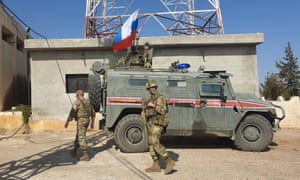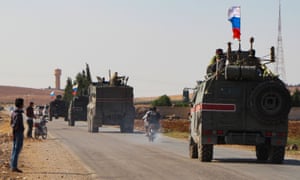More Russian troops arrive in border region as Donald Trump hails situation as a ‘big success’
Russian troops have expanded their presence across north-eastern Syria, the result of an agreement
between Ankara and Moscow that should end Turkey’s attack on
Kurdish-led forces at the price of ending the Kurds’ dreams of local
autonomy.
Syrian and Russian media showed footage of Russian military police vehicles on the outskirts of the important towns of Manbij and Kobani on Wednesday, one day after the Turkish president, Recep Tayyip Erdoğan, met Vladimir Putin in Sochi.
A statement carried on Russia’s Interfax agency said Russian patrols had already begun inside Manbij, a town that until two weeks ago was a key US base in the region.
The deal was hailed as a “big success” by Donald Trump, although his critics say it cements Russia’s role as prime power broker in the Middle East after the US president’s announcement that American special forces would withdraw from the area.
The US president was planning to make a fresh statement on the issue on Wednesday morning. In an earlier tweet he claimed the Kurds were safe and Isis prisoners secured.
Syrian and Russian media showed footage of Russian military police vehicles on the outskirts of the important towns of Manbij and Kobani on Wednesday, one day after the Turkish president, Recep Tayyip Erdoğan, met Vladimir Putin in Sochi.
A statement carried on Russia’s Interfax agency said Russian patrols had already begun inside Manbij, a town that until two weeks ago was a key US base in the region.
The deal was hailed as a “big success” by Donald Trump, although his critics say it cements Russia’s role as prime power broker in the Middle East after the US president’s announcement that American special forces would withdraw from the area.
The US president was planning to make a fresh statement on the issue on Wednesday morning. In an earlier tweet he claimed the Kurds were safe and Isis prisoners secured.
Big success on the Turkey/Syria Border. Safe Zone created! Ceasefire has held and combat missions have ended. Kurds are safe and have worked very nicely with us. Captured ISIS prisoners secured. I will be making a statement at 11:00 A.M. from the White House. Thank you!
Turkish troops, allied Syrian rebel proxies, the Kurdish-led Syrian Democratic Forces (SDF) and soldiers belonging to the Syrian president, Bashar al-Assad, are now all present in the border zone, with Russia the only negotiating force between them.
The talks on Tuesday between Erdoğan and the Russian president defined the contours of Turkey’s long-proposed border “safe zone”: Turkish troops in the area seized since the offensive began on 9 October will remain in situ, and Russian soldiers and the Syrian army will control the rest of the frontier.

Moscow and Damascus will supervise the removal of Kurdish fighters and weaponry to the depth of 18 miles (29km) from their current positions on the border before 26 October, after which joint Russian-Turkish patrols will begin across the entire border area to a depth of six miles, with the exception of the de facto Kurdish capital, Qamishli.
On Wednesday, the Russian ministry of defence published a map showing 15 planned border observation posts that will be manned by the Syrian regime.
The deal in effect redraws the map of northern Syria and ends five years of semi-autonomy carved out by the local Kurdish administration and its military forces, after Kurdish officials reached an agreement with Assad, their former enemy, for military reinforcements to fend off the Turkish attack.
However, the fate of local military councils set up by the SDF in border towns previously under their control and what happens to the SDF’s non-Kurdish units remains unclear. The SDF and Kurdish politicians are yet to comment on the Sochi deal.
It is believed they will retain control of the approximately 90,000 men, women and children with links to Islamic State being held in Kurdish-run prisons and detention camps.
Turkish officials including Erdoğan threatened on Wednesday that Ankara would resume the offensive if neither Russia nor the US guaranteed the total withdrawal of Kurdish fighters from the border region.
Erdoğan asked Putin what would happen if the People’s Protection Units (YPG), the largest and most important unit within the SDF, put on Syrian army uniforms in order to stay in the border area, according to Hürriyet newspaper.
Ankara says the YPG is indistinguishable from the outlawed Kurdistan Workers’ party (PKK), which has waged an insurgency against the Turkish state for decades. Erdoğan said Putin responded by saying he would not let that happen.
The border towns of Ras al-Ayn and Tel Abyad, which have experienced fierce fighting, remained quiet on Wednesday, one day after a separate, poorly observed US-brokered ceasefire expired.
Trump tweeted: “Safe Zone created! Ceasefire has held and combat missions have ended. Kurds are safe and have worked very nicely with us. Captured ISIS prisoners secured.”
Erdoğan is scheduled to visit the White House next month.
The deal was greeted more cautiously by the Nato secretary general, Jens Stoltenberg, who said the need for a political solution in north-east Syria would be discussed by defence ministers in Brussels on Thursday.
At least 120 Syrians have died and 176,000 people have fled their homes over the last two weeks of violence, with 20 Turkish civilian deaths on the other side of the border.


No comments:
Post a Comment